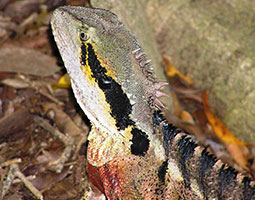Intellagama lesueurii
Description

The Eastern Water Dragon (Intellagama lesueurii) is a medium to large sized lizard, with some growing up to 80cm in length when including their long tail. They are normally found around creeks, rivers or lakes in eastern Australia as well as southern New Guinea. In Toohey Forest they are mostly seen near Mimosa Creek. They are semi-aquatic (living partly on land and partly in water) and can stay submerged for up to two hours before rising to the water surface to breathe.
Their colour consists of shades of grey or brown with a series of black bands on the back and tail. Males have a red coloured chest and belly, mostly seen when they lift their heads in a defensive mode and also during the breeding season in spring. After mating a female dragon will dig a hole in a sunny, sandy location and lay between 6 to 18 soft eggs that will hatch in three months.
Adaptations
- Strong tail is flattened on the sides to assist with swimming
- Legs are long and powerful which assists with running and climbing to avoid predators
- The nostrils are located on top of it's snout to allow almost all of their body to be submerge in the water to regulate their body temperature
- Serrated teeth to crush food
Feeding relationships
- What I eat: Insects, frogs, yabbies', water insects, fruit and berries
- What eats me: Snakes, predatory birds such as kookaburras, butcherbirds and currawongs. Introduced animals such as foxes, cats and dogs can cause death and injury
Interesting facts
Like many lizards, water dragons have a parietal eye, a light sensitive ‘third eye' located in the top of the head. It is sensitive to changes in light and dark, it does not form images.